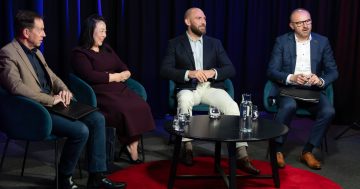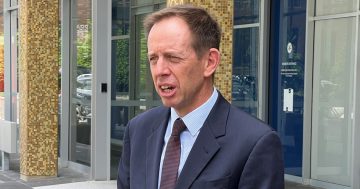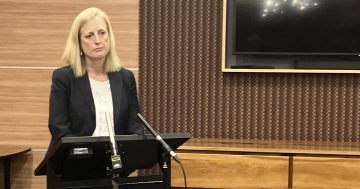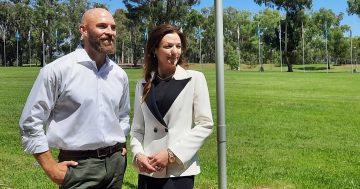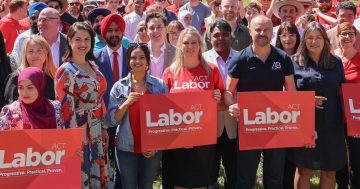
James Savoulidis, Tjanara Goreng Goreng, Zed Seselja, Kim Rubenstein, Katy Gallagher, David Pocock at the Region Media Senate Candidate Debate. Photo: Michelle Kroll.
The unexpectedly diverse and tight ACT Senate race has galvanised political involvement but also left many voters confused about how their preferences will affect the result.
Unlike state senators, the ACT’s two senators’ terms are tied to the House of Representatives and they face the voters at every election.
The significantly smaller number of representatives also means that while the method of calculating a quota is the same (one, divided by the number of seats up for election, plus one), the results are quite different in the ACT.
In the states (each represented by 12 senators), an election quota is just over 14 per cent at a half-Senate election and around 8 per cent for a double dissolution. Theoretically, this makes it easier for a determined independent to be elected.
But in the ACT, senators must reach a 33 per cent quota, or one-third of the vote. In practice, this has also meant that one Labor and one Coalition senator have been voted in at every election after preferences have been distributed.
Given the strong margins enjoyed by Labor across the House of Representatives seats and 20 years of Labor government locally, it’s always seemed notionally possible for the Liberal Senate seat to be lost to the Greens or an independent challenger.
But could that really happen this time around?
Emeritus Professor of political science at the ANU John Warhurst says there’s been enormous confusion about “strategic” preference voting.
“I’ve had more people than ever ask me how this will all work out. Many voters, for example, thought that a combination of Katy Gallagher and David Pocock would be their preferred result but don’t know who to vote for first,” he says.
“A few months ago, everyone thought that Katy Gallagher would win easily and have plenty of surplus votes, so they could comfortably vote for an independent first and her second.”
Professor Warhurst is not sure Senator Gallagher is in as much trouble from the potentially fractured progressive vote as recent speculation suggests. He thinks letters of support from former Prime Minister Julia Gillard and targeted texts from senior politicians like Penny Wong are more strategic in intent.
“I think they’re a shot across the bows, trying to show Labor supporters who might have drifted that they should not take the result for granted,” he says, noting that Julia Gillard has also been supporting Labor women candidates in other seats under challenge from independent and Green candidates.
And while he believes Senator Seselja is under significantly more pressure, Professor Warhurst notes that he’s faced concerted campaigns in the past.
“Generally, they fall short because it’s a major ask in the ACT to take a major party below a third [of the vote],” he says.
“Contenders like the UAP candidate [James Savoulidis] are a wildcard with 5 or 6 per cent of the vote. You’d think those preferences would go to Zed. Even if Zed is down to 26 per cent, the independents have a big challenge to make the quota.
“Preference flows will need to be very tight. Everything has to go right for the independents.”
Professor Warhurst says Senator Seselja may also benefit if there’s a late return towards the government as swinging voters face the reality of changing government.
“A half per cent would be meaningful for him. I think there’s probably a 90 to 95 per cent chance he will be re-elected even with an incredibly strong campaign against him.”
He thinks it’s also unlikely there will be a change in most surrounding NSW seats, including Eden-Monaro, where Kristy McBain sits on a margin of just 0.9 per cent.
“I don’t think the Liberals ever thought they’d win Eden-Monaro. I’m not sure the Prime Minister has even been there during the campaign. Gilmore is possibly more likely to change hands, but the general swing away from the government means they haven’t spent much time targeting marginal seats.”
Professor Warhurst thinks Labor will win the election with around 78 seats, not a landslide, but a comfortable margin to govern in their own right.
For the government to survive, they’ll need to win several seats, including perhaps Gilmore, Hunter or Parramatta. Professor Warhurst points out that it can be a trap to presume sweeping national trends will overcome local sentiments and issues.
And while he believes some ‘teal independents’ will win, it’s less likely that those standing against moderate candidates will succeed.
“Zali Steggall was running against Tony Abbott in Warringah, Cathy McGowan defeated Sophie Mirabella in Indi [in 2013]. They were both very unpopular candidates.
“I think that’s less certain with candidates like Dave Sharma [in Wentworth in Sydney’s eastern suburbs] and Trent Zimmerman [in North Sydney].
“What I also find fascinating is what will happen with all that energy in those campaigns. These people have been highly motivated and I suspect many will saddle up again next time, especially if the Morrison Government is re-elected.”












